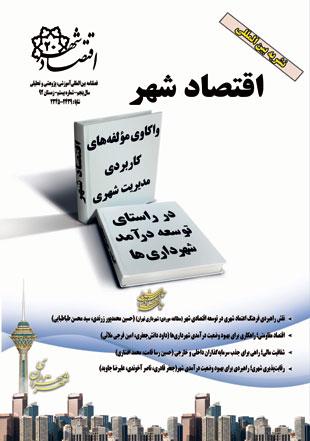فهرست مطالب

نشریه اقتصاد و برنامه ریزی شهری
سال پنجم شماره 20 (زمستان 1392)
- تاریخ انتشار: 1392/12/20
- تعداد عناوین: 16
- یادداشت
-
صفحه 5
-
صفحه 7
- مقاله های بخش ویژه
- اقتصاد شهری در جهان
- دیدگاه
-
شهر الکترونیک، ابزاری کارآمد به منظور کاهش هزینه های شهری در راستای توسعه اقتصادی شهر / در گفتگو با آقای محمدباقر دشت گرد (مدیر عامل موسسه فناوران شهر تهران)صفحه 65
- گزارش های علمی و اجرایی
- معرفی کتاب
- دانش نامه اقتصاد شهری
- معرفی مجله های داخلی و خارجی
-
Page 8Nowadays, building trust among citizens and removing pessimism over municipalities are of urban managers’ priorities. Through cohesive and efficient planning, it is possible that the ways for building citizens’ trust to take role in the economic development of the city can be paved. That is because urban managers, to achieve much more success, require exploiting such a potential in providing the needed finance. One of the factors contributing to obtaining sustainable income is establishing the culture of trust-building among citizens. Recently, the municipality of the metropolise of Tehran has been trying to achieve such an aim in a way that accomplishments have also been observed. The current article, which is practical, purpose-wise, collects the required data through library research. The article, via introducing definitions of “trust” and clarifying its dimensions, investigates into the importance of such a vital factor in citizens’ life and the effects of which on the performance of the organization and other factors of urban management. Besides, methods and approaches adopted by Tehran municipality to different developmental, cultural, social, transportation, etc. domains to help achieving such great change are introduced. The current article indicates that the extent of “trust” is determined by the mutual action between people’s values, approaches, states, and emotions and is increased by a positive approach to the activities of urban management and by enhancing the quantity and quality level of the services offered to the citizens, having active financial participation of the citizens in the development of the city in consequence.Keywords: trust, citizenship trust, building, citizen's participation, city development
-
Page 18Undoubtedly, achieving sustainable development, both nationally and locally, requires national will with specific plans. All governmental and non-governmental organizations, equipped with the roadmap, are to pave the way for development. In this regard, the 2 principles of resistive economy are the guidelines for achieving sustainable development. Municipality, as the most effective organization in managing the city- and citizens-related issues, takes a unique role in the realization of resistive economy which is achievable upon the efforts of the institution to make the incomes of the municipality sustainable. The current article, emphasizing the dimensions and principles of resistive economy based on analytic-descriptive method, makes an investigation into the 24 principles stipulated in the deed, informed by the Supreme Leader of the Islamic Revolution, which has direct and indirect effect on municipalities’ incomes. The current research is practical and applied, purpose-wise. The required data were collected though document analysis. Upon the results obtained, entrepreneurship and public participation, foreign investment and attracting capital, urban diplomacy, increasing efficiency and enhancing organizational culture are among the solutions for obtaining income for municipalities according to the 24 principles of resistive economy.Keywords: resistive economy, sustainability of income, municipality
-
Page 31Financial reporting is regarded as a reassuring link between the providers of financialresources for city management and urban managers. Although financial sustainableresources are necessary for financing the expenses of managing the city and it isnecessary that a considerable financial transaction be made from central government tothe municipality or any other service-providing organization, the experience of othercountries, especially the developed ones, indicate that moving towards providingsustainable financial resources for managing the cities has gained such a status that it isnot easy to ignore it. The current article, first, the concepts of financial clarity andfinancial reporting are introduced and, then, the importance of trust-building forcitizens and investors is investigated, and, at the end, issues in domestic and foreigninvestment and the role whereof on providing financial resources for municipalities areexplicated. The present research is descriptive, method-wise, the purpose of which is toindicate the effect of financial clarity on attracting citizens and domestic and foreigninvestors for financing urban services and projects. The results indicate that financialclarity in organizations better enables domestic and foreign investors to decide oninvestment in the city and that the citizens would take a more active role in managingthe city.Keywords: financial clarity, domestic, foreign investment, sustainable financial resources
-
Page 43The current article, taking an analytic approach, besides considering the importance of competitiveness in metropolises, makes an attempt to take its preconditions into account. Generally, the preconditions for improving competiveness can be dividedinto two factors: soft factors and hard ones. Soft factors, practically, include contentrelated and background issues which have effects on the cities’ economic changes and hard factors are mainly related to the infrastructure and designing of cities. Thus, any planning for improving the status of each metropolis, in its competition with its counterparts, necessitates evaluating environmental conditions and considering the related strengths, weaknesses, opportunities, and threats. Therefore, cities’ economic development is tightly connected with careful observing of global trends and changes in economic, political, and social domains. The current article, following explicating soft and hard factors which take role in urban competitiveness, brings the factor of social capital - as an example of soft factors - into foreground and, finally, the status quo of the city of Shiraz is expounded so that odds for improving its competitiveness could be investigated.Keywords: urban competiveness, metropolis, income improvement, social capital

